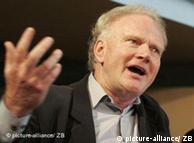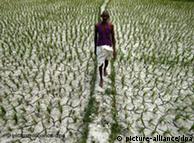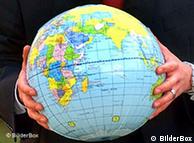Climate | 22.07.2008
Sociologist: Climate Change is a Chance to Work Together
Climate change offers Europe a chance to change the way the world solves problems by drawing in poorer countries, says sociologist Ulrich Beck in an exclusive essay for DW-WORLD.DE.
Ulrich Beck is a professor of sociology at the Ludwig Maximilian University in Munich and the London School of Economics and Political Science. His publications focus on the possibilities of European integration.
Climate change is a problem that the younger generations (particularly in Europe) take very seriously, both personally and politically. Although climate change represents a horrible danger to humanity, it also offers a wonderful chance to turn politics into collective action.
The EU deserves praise for its groundbreaking efforts against climate change. It can take on a global leadership role and has the possibility to bring about a paradigm shift in world politics.
But the situation also raises great expectations. The world is hoping for progress from Europe in the cosmopolitan project and evidence that it's possible to reduce carbon dioxide emissions without cutting back on social benefits or economic growth.
Cosmopolitan realpolitik
 Bildunterschrift: Großansicht des Bildes mit der Bildunterschrift: Ulrich Beck
Bildunterschrift: Großansicht des Bildes mit der Bildunterschrift: Ulrich Beck
For the first time in history, every population, every culture, every ethnic group and every religion in the world is living with a common future that is a threat to us all. In other words, if we want to survive, we have to incorporate those who have been excluded thus far.
The politics of climate change is necessarily inclusive and global -- it is, as I would like to call it, cosmopolitan realpolitik.
Climate change forces us to realize that, if we want to effectively maintain equality and fairness, we have to take on the views of "the others" -- that is, of the poorer countries -- as our own. On the one hand, they will suffer the most from climate change, but on the other hand, they contribute the least to the potential climate catastrophe.
Europe and the world risk society
For this reason, Europe should make it clear that the problem of inequity needs to be addressed much more generally, and not just in terms of deceptively narrow figures like GNP or per capita income.
Europe also has to concentrate on the fatal attraction between poverty, social vulnerability, corruption, humiliation, the accumulation of danger and the loss of dignity -- all factors that build up social divides, influence attitudes and behavior and are becoming more significant in the world risk society.
Only if we incorporate the affected people in our decision-making, will we be in a position to effectively protect ourselves from the consequences of climate change.
 Bildunterschrift: Großansicht des Bildes mit der Bildunterschrift: Those most effected by climate change should be involved in the solution, says Beck
Bildunterschrift: Großansicht des Bildes mit der Bildunterschrift: Those most effected by climate change should be involved in the solution, says Beck
In this respect, the problem of global warming could change the central political paradigm though which cosmopolitanism becomes realpolitik and nationalism or national policy becomes backward-looking idealism.
More than any other global problem, climate change legitimizes the search for a rule-based system of international politics and offers the chance to find ways to ensure security and global public commodities.
We have to understand that risks anticipated with fear -- like climate change or financial catastrophes -- are global and that we need a cosmopolitan system of supervision and participation to overcome these problems.
Model and mission for the next generation
Europe has the chance to develop a paradigm that shows how to approach climate change and other global dangers through cross-national cooperation which enriches national identities and sovereignties by winning them over to cosmopolitan realpolitik.
In this way, Europe -- as both a model and a mission -- could develop a strong sense of motivation, especially for the younger generation, while at the same time showing non-European nations the alluring opportunity for a new enlightenment in today's wordless global society.

Comments